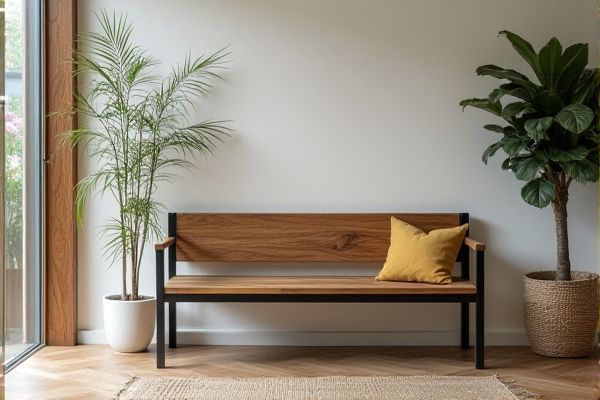
Wooden benches offer natural warmth and aesthetic appeal, blending seamlessly with outdoor environments, while metal benches provide superior durability and resistance to weather conditions, making them ideal for high-traffic areas. Discover which bench suits Your needs best by exploring the detailed comparison in the rest of this article.
Table of Comparison
| Feature | Wooden Bench | Metal Bench |
|---|---|---|
| Material | Natural wood (oak, pine, teak) | Steel, aluminum, iron |
| Durability | Moderate; susceptible to weather damage and rot | High; resistant to weather and rust when coated |
| Maintenance | Requires regular sealing or staining | Low; occasional painting or rust prevention |
| Weight | Light to moderate | Heavy, depends on metal type |
| Aesthetic | Warm, natural, traditional look | Modern, sleek, industrial appearance |
| Comfort | Generally more comfortable; can be customized with cushions | Less comfortable without cushions; metal can heat or cool quickly |
| Cost | Moderate to high depending on wood type | Varies; often economical but depends on metal quality |
| Environmental Impact | Biodegradable; source impacts sustainability | Recyclable; production energy-intensive |
Introduction to Wooden and Metal Benches
Wooden benches offer natural warmth, durability, and classic aesthetics ideal for outdoor and indoor settings, typically crafted from hardwoods like teak or cedar. Metal benches, often made from aluminum or wrought iron, provide superior strength, weather resistance, and modern design versatility, requiring minimal maintenance. Both materials serve different style preferences and functional needs in parks, gardens, and urban environments.
Material Composition and Properties
Wooden benches feature natural materials like hardwood or softwood, offering warmth, aesthetic appeal, and moderate durability with resistance to temperature changes and minor impacts. Metal benches, commonly made from steel or aluminum, provide superior strength, durability, and weather resistance but may require coatings to prevent rust and heat absorption. Your choice depends on the desired balance between natural appearance and long-lasting structural performance.
Aesthetic Appeal: Wood vs Metal
Wooden benches offer a natural, warm aesthetic that complements garden and park settings with their rich textures and organic tones, creating a timeless charm. Metal benches provide a sleek, modern look with clean lines and smooth finishes, ideal for contemporary urban environments and durable outdoor use. Your choice between wood and metal benches shapes the overall visual impact and ambiance of your outdoor space.
Durability and Longevity Comparison
Wooden benches, typically crafted from hardwoods like teak or oak, offer natural durability with resistance to weathering when properly treated. Metal benches, often made from steel or aluminum, provide superior strength and longevity with minimal maintenance, resisting rust through powder-coating or galvanization. Overall, metal benches generally outperform wooden benches in durability and lifespan, especially in harsh outdoor environments.
Maintenance Requirements
Wooden benches demand regular maintenance such as sanding, staining, or sealing to protect against weather damage and prevent rot or splintering. Metal benches typically require less frequent upkeep but may need periodic rust treatment and repainting to maintain their durability and appearance. Choosing between wooden and metal benches depends on your willingness to invest time in maintenance and the environmental conditions they will face.
Comfort and Ergonomics
Wooden benches provide natural warmth and a slightly flexible seating surface, enhancing comfort during extended use through their ergonomic contours that adapt to body shapes. Metal benches offer robust support and durability but can be less comfortable without cushions due to their rigid and often cold surfaces, which may cause discomfort in varying weather conditions. Ergonomic designs in wooden benches often include curved seats and backrests that promote better posture, whereas metal benches require additional padding or design modifications to achieve similar ergonomic benefits.
Weather Resistance and Outdoor Use
Wooden benches, typically crafted from hardwoods like teak or cedar, offer natural resistance to weather but require regular sealing and maintenance to prevent damage from moisture, UV rays, and temperature fluctuations. Metal benches, often made from aluminum or steel with powder-coated finishes, provide superior weather resistance by resisting rust and corrosion, making them highly durable for long-term outdoor use. Choosing between wooden and metal benches depends on balancing the aesthetic appeal and warmth of wood with the low-maintenance, weatherproof qualities of metal.
Environmental Impact and Sustainability
Wooden benches offer greater sustainability due to their renewable nature and potential for sourcing from responsibly managed forests, which decreases carbon footprint and promotes biodiversity. Metal benches, often made from steel or aluminum, require energy-intensive extraction and processing, leading to higher emissions, but they provide durability and recyclability that can extend their lifespan. Choosing wooden benches with certified eco-labels supports environmental conservation, while metal benches can be more sustainable if manufactured using recycled materials and eco-friendly processes.
Price and Value for Money
Wooden benches typically offer a higher initial cost compared to metal benches but provide exceptional aesthetic appeal and comfort, enhancing long-term value in residential and decorative settings. Metal benches are generally more affordable, durable, and low-maintenance, making them cost-effective choices for public parks and high-traffic areas where longevity and resilience are prioritized. Evaluating price alongside factors such as maintenance, lifespan, and style is crucial for determining the best value for money between wooden and metal benches.
Best Applications: Choosing the Right Bench
Wooden benches are ideal for parks and gardens where natural aesthetics and comfort are priorities, offering warmth and blend with greenery. Metal benches suit urban environments and high-traffic areas due to their durability, resistance to vandalism, and low maintenance. Selecting the right bench depends on factors like environment, intended use, and desired longevity, with wood favored for rustic appeal and metal for strength and weather resistance.
 homyna.com
homyna.com